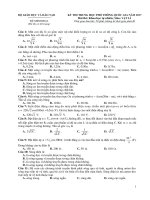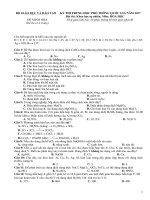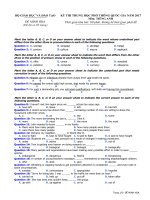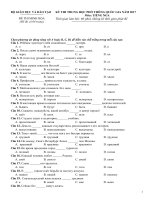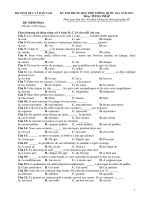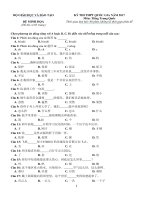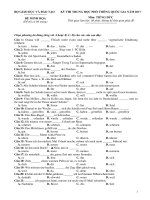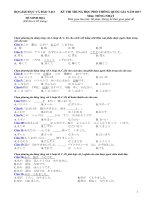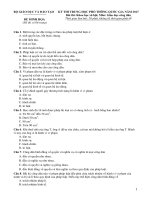Đề vip 9 phát triển Đề minh họa tham khảo bgd môn anh năm 2024 ( vn3)
Bạn đang xem bản rút gọn của tài liệu. Xem và tải ngay bản đầy đủ của tài liệu tại đây (73.2 KB, 4 trang )
<span class="text_page_counter">Trang 1</span><div class="page_container" data-page="1">
<b>ĐỀ THAM KHẢO THEOĐỀ MINH HỌA BGD NĂM 2024</b>
<b>ĐỀ 9 – VN3</b>
<i>(Đề thi có … trang)</i>
<b>KỲ THI TỐT NGHIỆP TRUNG HỌC PHỔ THƠNG 2024Mơn thi: TIẾNG ANH</b>
<i>Thời gian làm bài: … phút, không kể thời gian phát đề.</i>
<i><b>Mark the letter A, B, C, or D to indicate the sentence that best combines each pair of sentences in thefollowing questions.</b></i>
<b>Question 1. We ran out of money. We came home from holiday early.</b>
<b>A. If we hadn’t run out of money, we would come home from holiday early.</b>
<b>B. If we hadn’t run out of money, we wouldn’t have come home from holiday early.C. If we hadn’t run out of money, we wouldn’t come home from holiday early.D. If we didn’t run out of money, we wouldn’t come home from holiday early.</b>
<b>Question 2. Phong had just finished the hotel management course. He started looking for a job.A. No sooner had Phong finished the hotel management course than he started looking for a job.B. Not until Phong started looking for a job did he finish the hotel management course.</b>
<b>C. Had it been for Phong’s completion of hotel management course, he would have started looking for a</b>
<b>D. Only after Phong started looking for a job did he finish the hotel management course.</b>
<b>Mark the letter A, B, C, or D on your answer sheet to indicate the correct answer to each of thefollowing questions.</b>
<b>Question 3. The conference brought together experts from all over ____ world to share ideas and propel</b>
advancements in their fields.
<b>Question 4. Recent research has ____ the idea that water is only to be found on planet Earth; evidence of it</b>
has been found on Mars.
<b>Question 5. Tickets for “Lat mat 7” _______ in the upcoming weeks.</b>
<b>Question 6. This sort of job requires good _____ and teamwork skills.</b>
<b>A. communicatorB. communicativeC. communicateD. communicationQuestion 7. Jack is not interested in going to university, _______?</b>
<b>Question 8. It’s important ___ us to carry out a campaign against violence in our school.</b>
<b>Question 9. You can imagine how ______ I felt when I realised I was wearing two different shoes.</b>
<b>Question 10. The students ______ grammar every day will improve their writing.</b>
<b>A. to practiceB. practicingC. was practicingD. practicedQuestion 11. If you would like to ______ a complaint, please fill in a form or speak to the manager.</b>
<b>Question 12. Eric ________ in the park when a strange man came up to him.</b>
<b>Question 13. Six people were injured when a bomb _____ near an army camp last night.</b>
<b>Question 14. Bill won’t leave the office ______________.</b>
<b>A. until he finishes writing his reportB. when he finished writing his reportC. as soon as he had finished writing his reportD. by the time he finished writing his reportQuestion 15. I was on the ___ of buying the cookbook when I realized that I had it already.</b>
<b>Question 16. Please don’t forget _____ the bedroom door when you go out as the cat keeps going in there.</b>
<b>Question 17. I think Geoff is __________ in the class at chess.</b>
<b>Mark the letter A, B, C or D on your answer sheet to indicate the word(s) CLOSEST in meaning to theunderlined word(s) in each of the following questions. </b>
</div><span class="text_page_counter">Trang 2</span><div class="page_container" data-page="2"><b>Question 18. When Eileen saw that her mother had bought the dress she wanted for herself, she was tickledpink.</b>
<b>Question 19. This necklace isn’t real gold ‒ I’m sorry to have to tell you that it’s completely worthless.</b>
<b>Mark the letter A, B, C, or D on your answer sheet to indicate the word that differs from the otherthree in the position of the primary stress in each of the following questions. </b>
<b>Question 21. A. excitingB. terrificC. attractiveD. qualified</b>
<i><b>Mark the letter A, B, C, or D to indicate the sentence that is closest in meaning to each of the followingquestions.</b></i>
<b>Question 22. I last took my child to the amusement park 2 months ago.A. I haven’t taken my child to the amusement park for 2 months.B. I haven’t taken my child to the amusement park since 2 months.C. I didn’t take my child to the amusement park for 2 months.D. I took my child to the amusement park 2 months ago.</b>
<b>Question 23. It’s not necessary for you to fill in this part of the form.</b>
<b>A. You mustn’t fill in this part of the form.B. You shouldn’t fill in this part of the form.C. You needn’t fill in this part of the form.D. You have to fill in this part of the form.Question 24. Rob said: “I will have an important job interview tomorrow.”</b>
<b>A. Rob said he would have an important job interview tomorrow.B. Rob said he will have an important job interview tomorrow.</b>
<b>C. Rob said he will have an important job interview the following day.D. Rob said he would have an important job interview the following day.</b>
<b>Read the following passage and mark the letter A, B, C, or D to indicate the correct word or phrasethat best fits each the numbered blanks (from 25 to 29).</b>
Reefs form under water and can be made of coral, sand or rock. The top of the reef sits about two or three feetbelow sea level. Coral reefs are found in warm, shallow, clean water and the Great Barrier Reef is the largestcoral reef of all. It (25) _____ for two thousand kilometres and forms a natural breakwater that protects thecoast of Australia from the strong waves of the South Pacific. There are (26) ___ islands on the Great BarrierReef formed by piled up coral and sand. They are, (27) ________, very difficult to reach as sharp coral willtear the bottom out of a boat. One must be careful not to step on living coral as it grows very slowly, aboutfive centimetres a year. The Great Barrier Reef is (28) ______ to many types of fish. There are also otheraquatic species (29) _______ depend on coral to protect them.
<b>Read the following passage and mark the letter A, B, C, or D on your answer sheet to indicate thecorrect answer to each of the questions from 30 to 36. </b>
When it comes to education options for school‒leavers, there are several paths to consider. One commonoption is pursuing higher education at a university or college. This path typically involves obtaining abachelor’s degree in a chosen field of study, which can provide a solid foundation for various careeropportunities. Universities and colleges offer a wide range of academic programs, allowing school‒leavers to
<b>explore their interests and specialize in areas that align with their career aspirations.</b>
Another option for school‒leavers is vocational education and training (VET) programs. VET
<b>emphasizes providing practical skills and knowledge that directly apply to specific industries or trades. These</b>
programs offer hands‒on training, preparing individuals for careers in fields such as healthcare, informationtechnology, construction, hospitality, and automotive industries. VET programs often include apprenticeshipsor internships, allowing students to gain valuable work experience while studying.
For those who prefer a more experiential approach, apprenticeships can be a valuable education option.Apprenticeships combine on‒the‒job training with classroom instruction, allowing school‒leavers to earnwhile they learn. They provide a unique opportunity to gain practical skills and industry‒specific knowledgedirectly from professionals in the field. Apprenticeships are available in a variety of industries, such asconstruction, culinary arts, electrical work, and healthcare.
</div><span class="text_page_counter">Trang 3</span><div class="page_container" data-page="3">Ultimately, the choice of education option for school‒leavers depends on individual interests, goals, andlearning preferences. Whether it’s pursuing higher education at a university, enrolling in a vocationalprogram, or embarking on an apprenticeship, each path offers distinct advantages and can lead to rewardingcareer paths. It's important for school‒leavers to explore and evaluate these options carefully to make an
<b>informed decision that aligns with their aspirations and sets them on a path to success.</b>
<i>(Adapted from Education Week)</i>
<b>Question 30. Which of the following can be the best title for the passage?</b>
<b>A. Making Informed Decisions: How to Choose the Right Education Path for School‒Leavers B. Mapping Future Careers: Exploring Opportunities for School‒Leavers </b>
<b>C. Exploring Various Education Options for School‒Leavers </b>
<b>D. Navigating Pathways after School: Education Options for Postgraduate </b>
<b>Question 31. According to the passage, the common path after leaving school for students is ________.A. VET programsB. internshipC. tertiary educationD. apprenticeshipQuestion 32. The word "align with” in paragraph 1 is closest in meaning to ________.</b>
<b>Question 33. The word "emphasize" in paragraph 2 is closest in meaning to ________.</b>
<b>Question 34. The word "them" in the last paragraph refers to ________ .</b>
<b>Question 35. Which of the following is NOT true according to the passage?</b>
<b>A. Pursuing higher education at a university or college typically involves obtaining a bachelor’s degree. B. Vocational education and training (VET) programs focus on providing practical skills and knowledge</b>
for specific industries or trades.
<b>C. School‒leavers have the opportunity to specialize in areas aligned with their career aspirations through</b>
university or college education.
<b>D. Apprenticeships do not offer any classroom instruction and are solely based on on‒the‒job training.Question 36. It can be inferred from the passage that ________.</b>
<b>A. Vocational education and training (VET) programs are more beneficial for school‒leavers than</b>
pursuing a university degree.
<b>B. Considering individual interests and career aspirations when choosing an education option for school‒</b>
<b>they pick the one that works best for them. They also expect students to take charge if things don't go as</b>
planned and to find help and support on their own.
Australians are also prepared to accept a range of opinions rather than believing there is one truth. Thismeans that in an educational setting, students will be expected to form their own opinions and defend thereasons for that point of view and the evidence for it.
<b>Australians are uncomfortable with disparity in social status and therefore admire the concept of treating</b>
everyone equally. An example of this is how the majority of Australian adults address each other by theirfirst names. This emphasis on equality results in Australians feeling uneasy about taking things too seriouslyand being willing to make jokes about themselves.
Australians believe that life should have a balance between work and leisure time. As a consequence, some
<b>students may be critical of others who they perceive as doing nothing but study. Australian notions of</b>
privacy mean that areas such as financial matters, appearance and relationships are only discussed with closefriends. While people may volunteer such information, they may resent someone actually asking them unlessthe friendship is firmly established. Even then, it is considered very impolite to ask someone what they earn.
<i>(Source: Complete IELTS Student Book by Guy Brook Hart and Vanessa Jakeman)</i>
<b>Question 37. The word they in paragraph 1 refers to .</b>
<b>A. teachers and course tutorsB. optionsC. AustraliansD. students</b>
</div><span class="text_page_counter">Trang 4</span><div class="page_container" data-page="4"><b>Question 38. The word disparity in paragraph 3 is closest in meaning to .</b>
<b>A. difference B. independence C. similarity D. equality Question 39. In paragraph 4, why some students are criticize of others who do nothing but study?</b>
<b>A. they think that life should have a balance between work and leisure time. B. they want some more privacy. </b>
<b>C. they don’t want others to study better than them. D. they prefer equality in education. </b>
<b>Question 40. Which of the following is TRUE, according to the passage?A. Students in Australia will be not expected to form their own opinions. B. Asking someone what they earn is considered fairly discourteous. C. A teacher or course tutor will not tell students what to do. </b>
<b>D. Australians usually don’t accept many other opinions. Question 41. Which best serves as the title for the passage?</b>
<b>A. Education in Australia </b>
<b>B. Balancing Work and Leisure in Australia C. Australian culture </b>
<b>D. Australians and their privacy </b>
<i><b>Mark the letter A, B, C or D to indicate the underlined part that needs correction in each of the followingquestions.</b></i>
<b>Question 42. When I lived in this city, I usually shop for groceries at this supermarket.</b>
<b>Question 43. We provide the best seats for our attendees, guaranteed to showcase minim</b> um discomfort.
<b>Question 44. The dog loves to play fetch in the park and goes for a walk with their owner.</b>
<b>Mark the letter A, B, C or D on your answer sheet to indicate the word(s) OPPOSITE in meaning to theunderlined word(s) in each of the following questions. </b>
<b>Question 45. Almost all the pupils at this school come from privileged backgrounds as only the most affluent</b>
parents can afford to pay the huge fees.
<b>Question 46. She was born in an impoverished family. It was a life full of pain and suffering.</b>
<b>Mark the letter A, B, C, or D on your answer sheet to indicate the word whose underlined part differsfrom the other three in pronunciation in each of the following questions. </b>
<b>Mark the letter A, B, C, or D on your answer sheet to indicate the most suitable response to completeeach of the following exchanges. </b>
<i><b>Question 49. Charlotte and Dave are talking about online learning.</b></i>
<b>‒ Charlotte: “I think online learning won’t be effective if students have problems with Internet.”‒ Dave: “_________________________”</b>
<b>A. You can say that again. B. No, it’s not true. </b>
<i><b>Question 50. Ben and Hien are in the school canteen.</b></i>
<b>‒ Ben: "_____________________?”‒ Hien: "No, thanks. I’m not thirsty."</b>
<b>A. Do you want to eat anything B. Do you like orange juice </b>
<b>C. What drink do you like D. Would you like something to drink </b>
</div>
